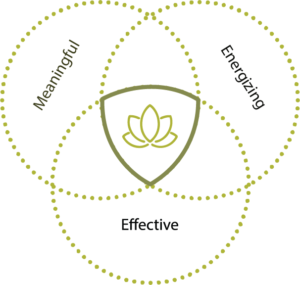Engagement, Alignment, Sustainable Success
[fusion_text]
How Does Engagement Work?
 Motivation matters. You can pay people to show up, but their hearts and minds, those things that are most valuable for leaders to engage, can only be given freely.
Motivation matters. You can pay people to show up, but their hearts and minds, those things that are most valuable for leaders to engage, can only be given freely.
A person’s heart and mind are inspired only when work is experienced as:
- Meaningful. Work is aligned with one’s sense of values, importance, and purpose
- Energizing. One is able to find interest and enjoyment in the work itself
- Effective. Desired results are supported and accomplished
We use the term, “Me Too” factor to describe how much meaning, energy, and effectiveness a person is experiencing. There are two reasons for this:
- When we ask someone how their Me Too factor is, we are asking how included they feel in the organization
- Me Too is a loose acronym derived from the M in meaning and the two Es that start the words energizing and effective
When the “Me Too” factor is high for individuals and groups we find the following benefits:
Higher Productivity
|
Better Relationships
|
Increased Commitment
|
How is the “Me Too” Factor Created?
We teach 7 Core Competencies for Engagement, Alignment, and Sustainable Success that mutually reinforce the experience of more meaning, more energy, and greater effectiveness. All of the core competencies reinforce daily habits that build positive and sustainable organizational culture. While leaders can invite engagement, we see engagement as a completely mutual responsibility. It’s best seen as a 100%/100% deal rather than 50%/50%. The 7 Core Competencies are:
- Motivational Wellness
We educate people regarding how motivation really works. They learn what motivates them and others in ways that promote engagement and wellbeing versus the types of motivation that hinder lasting engagement and wellbeing. - Psychological Safety
Psychological safety may be the least understood and most important phenomena in the workplace. In brief, when people feel safe to contribute they will do so. Otherwise, their best thinking will simply not be available to the organization. It doesn’t take much to undermine safety, and a group effort is required to create and maintain it. We teach work teams how to create and maintain safety with each other so everyone’s best thinking will continually surface. - Aligning Individual & Organizational Needs
When leaders are missing this competency, people with other engagement skills will likely find work elsewhere. People need to see themselves as a meaningful part of what the organization does. They need to know, and see how, what they do on a daily basis contributes. Leadership needs to take primary responsibility for illustrating this vital connection. - Strengths-Based Conversations
We teach critical conversation skills that invite strengths while building trust and alignment. These skills are necessary in daily workplace functioning and diminish the need for intervention style conversations that can be too little, too late solutions. - Recognizing Unique Strengths
We help people discover their most meaningful, energizing, and effective actions – and we help them apply those actions in challenging situations. We all have unique ways of being that can be utilized as strengths. However, these ways of being are often forsaken as weaknesses as people attempt to “balance” themselves in honest efforts to better themselves. We help people capture what’s best about them and utilize these strengths as only they can, in a way that maximizing their ability to contribute to organizational goals. - Creating Strengths-Based Options
We teach choice-recognizing skills that reduce stress, create strength, and broaden the range of options perceived in tough situations. These skills reduce the frequency and severity of being stuck without solutions – and free up energy toward accomplishing important work while also preserving wellbeing. - Work-Life Balance
Work is an integral part of life. When other parts of our lives aren’t going well, it can affect the quality of our work. Therefore, supporting our people to successfully manage other necessary parts of life, supports their best efforts at work. We educate people regarding how they can uniquely attend to all the necessary areas of life in the most meaningful, energizing, and effective ways.
[/fusion_text][title size=”1″ content_align=”center” style_type=”double solid” sep_color=”#afb636″ margin_top=”” margin_bottom=”” class=”” id=””]Contact Us[/title][fusion_code]W2NvbnRhY3QtZm9ybS03IGlkPSI4OTUiIHRpdGxlPSJDb250YWN0IFBhZ2UiXQ==[/fusion_code]